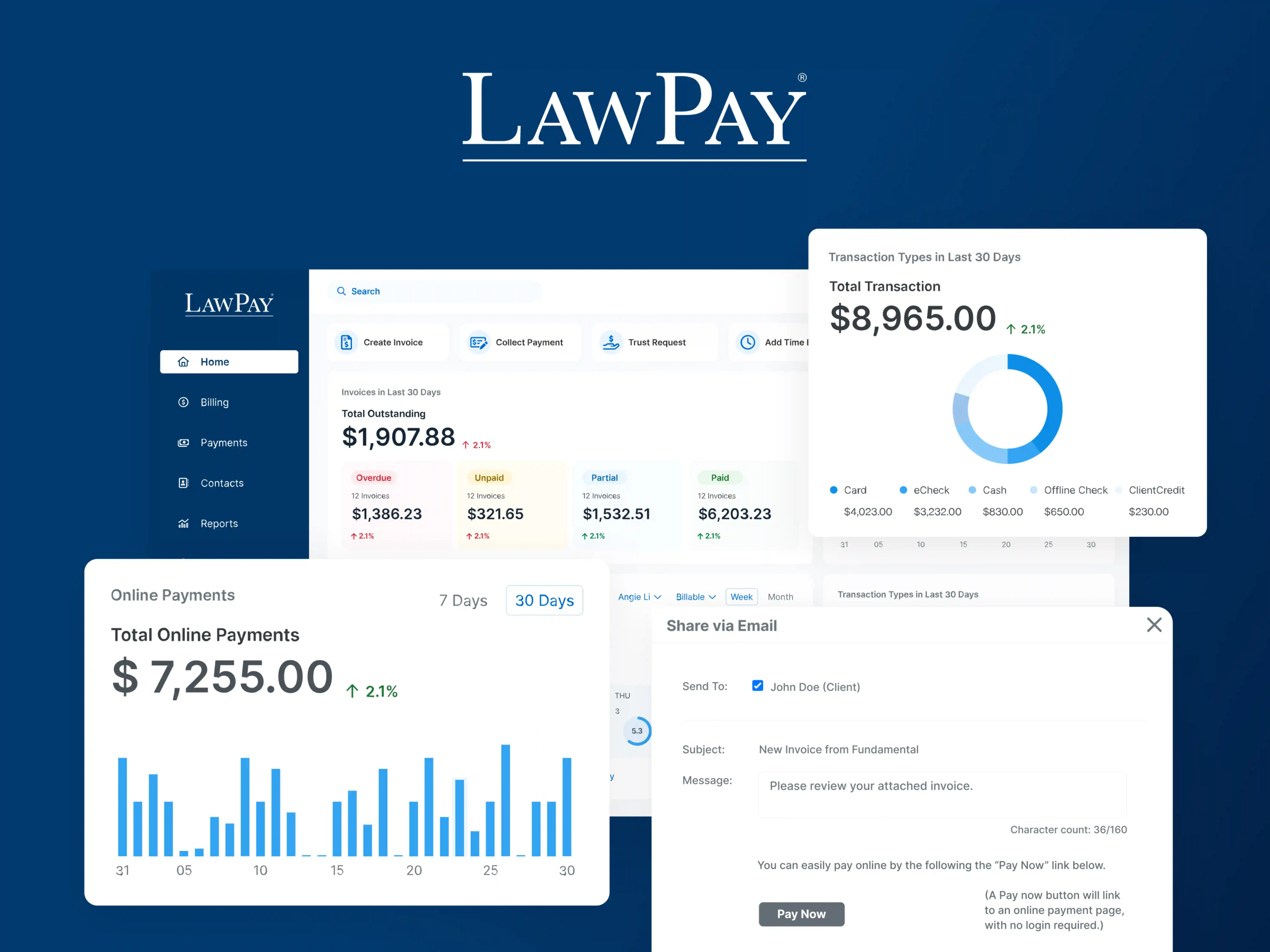Key takeaways
Recurring payments simplify law firm billing. With a one-time setup, automated billing eliminates the need to chase unpaid invoices—freeing up valuable time for both attorneys and clients.
Predictable income supports better financial planning and expands access to legal services by offering manageable payment options for clients.
Automated systems handle reminders, payment processing, and account syncing, so you can spend less time managing billing and more time practicing law.
When time is one of your most precious resources, chasing unpaid invoices is a costly expense that can quickly chip away at billable hours. Overdue payments are also a reality of many law firms that would be better served by the simple solution of recurring payments.
Chances are you're already familiar with the concept of recurring payments in your personal life, but is your law firm applying the same stress-free approach to your practice's finances?
Fortunately, it’s simple to adopt and saves time for lawyers and clients.
What Are Recurring Payments?
Recurring payments, also known as automatic payments, are pre-authorized transactions that allow a business to charge a customer for services or goods on a set schedule. They require a one-time setup where both parties agree to the frequency of the transactions (weekly, monthly, or annually), and then subsequent transactions are performed according to the selected interval.
This recurring billing model also permits customers to choose which account is charged. Customers select an account during the initial setup and the billing software safely stores the information for future use. The most commonly used methods of payment are a debit card, credit card, or bank account via an ACH transfer (like eChecks).
When done correctly, recurring payments can benefit law firms' cash flow and contribute to their long-term success. This payment system also provides a unique revenue predictability that is imperative for scalable growth and understanding projected finances.
How Do Recurring Payments Work?
For law firms, one of the easiest ways to implement automated recurring payments is through a legal billing and payments software. Serving as a do-it-all solution, these digital services handle every step of the online payments process to give you more time to focus on your case or growing your clientele.
Regardless of which platform your law firm chooses for managing automated recurring payments, the main steps remain the same:
Step 1. Present your client with your firm's recurring payment option models.
Step 2. Communicate the terms and conditions, and have them sign off on their chosen automatic billing model. This will include information like the amount charged, payment schedule, and expiration date (if any).
Step 3. Enter the client's payment information and obtain their permission to safely store it within the billing software for subsequent transactions.
Step 4. Before funds are released to your law firm's account, the acquiring bank, issuing bank, and credit card network must all approve the transaction.
Step 5. For each recurring payment, your client will receive an invoice that demonstrates the transfer of funds for a successful transaction. Your firm may also choose to notify the client with a payment reminder a few days before the scheduled transaction.
Step 6. Clients' payments will post automatically to the appropriate account and sync records within your payment processing platform.
Benefits of Accepting Recurring Payments
A recurring payment model puts your cash flow on autopilot, so you can focus your attention where it matters most. Below are some of the most compelling reasons to accept repeat payments.
Accelerated Payment Processing
After the initial setup, the automated billing cycle is a hands-free approach that allows for faster payment processing for you and your clients. The client bypasses the need to enter payment information for each transaction, and your firm can expect a regular influx of income directly to their bank account.
Improved Budgeting and Planning
Recurring payments provide invaluable foresight to plan your firm’s budgeting expenses. By calculating the revenue from active clients on this payment model, you can more accurately assess your finances for day-to-day office activities or future marketing endeavors. This quantifiable and predictable income allows you to understand your cash flow with a high level of certainty, thus making future financial decisions that much more sound.
Stronger Security and Compliance
When accepting scheduled payments, most billing software (like LawPay) complies with the Payment Card Industry Data Security Standard (PCI DSS) to safely store sensitive credit card information.
These guidelines ensure a secure environment that prevents information from being compromised or stolen, allowing clients to breathe easy and your firm to maintain compliance standards.
Why Are Recurring Payments Optimal for Law Firms?
Scheduled payments are one of the simplest ways for law firms to save time and maintain a steady cash flow. They provide useful business insights that come with a high degree of predictability and ensure quicker processing times for both the client and your firm.
By accepting recurring payments, your law firm will:
Spend less time chasing after invoices. By making it easier for clients to pay, automatic payments negate the need to follow up on overdue payments. They also help you avoid awkward conversations that shift the focus from serving your client to finances.
Increase cash flow. Late payments have a negative impact on cash flow and can result in late fees that diminish the client experience. With automated recurring payments, your cash flow is predictable, effortless, and more likely to increase.
Improve client relations. By helping your client with the flexible, one-time setup, you’ll demonstrate a sensitivity to their financial situation. This also shifts your following interactions primarily on their legal needs.
Take on more clients. Payment plans allow access to clients that may otherwise not be able to afford your legal services. A recurring payment alleviates the financial burden of the upfront cost and allows a wider client base to access your services.
Reduce administrative tasks. When you accept recurring payments, the billing service provider keeps track of stored card details to make sure they're always up to date. You no longer have to worry about expiring cards, late payments, or chasing after updated information.
How To Choose the Best Recurring Payment Platform for Your Law Firm
A digital payment platform allows you to accept online payments and easily integrate a recurring billing model. When comparing platforms for your law firm, you’ll want to consider the following criteria:
Prioritize PCI Compliance for Secure Transactions
When clients pay by credit card, they're trusting you with sensitive data that requires specific protection. PCI compliance ensures that your law firm is taking the necessary actions to protect client data and minimize risk from external threats.
One way to offload this risk is by using a Level 1 service provider, which is the highest level of security available. For example, LawPay uses a proprietary Level 1 Card Vault technology to encrypt card details within the payment system. This simple and secure process will bring peace of mind to clients and law firms.
Look for Platforms That Support Multiple Payment Methods
Streamline the billing process with billing software that accepts multiple forms of payment. Whether it's credit, debit, eCheck, or automated payment plans, adopting a comprehensive platform allows you to offer clients greater flexibility and maximize your opportunities to get paid.
Certain platforms, like LawPay, make accepting payments a breeze by granting access to the Legal Payments Network. This expansive network connects you to thousands of banks and accounts payable vendors, so you can get paid faster while accepting a wide range of payment methods.
Choose Mobile-Friendly Solutions for Greater Flexibility
For modern clients and lawyers on-the-go, payment platforms with mobile apps are a reliable method of managing payments at your fingertips. You can enter and securely accept payments from your smartphone or tablet while staying up-to-date on your transaction history. For example, the LawPay mobile app includes the ability to scan payment information by using the camera on your mobile device.
Opt for Custom Reporting To Track What Matters
The best recurring payment platforms understand that your firm is unique—and your reporting should be too. While general reporting dashboards excel at providing a bird's-eye view of a business, they don't give you the bigger picture required to tell a story.
Custom reporting is an indispensable tool that allows you to tailor reports that reveal the data you need. Comprehensive reporting for lawyers also provides real-time data that makes reconciliation a breeze.
Set Up Recurring Payments & Get Paid Faster with LawPay
Ultimately, the recurring billing model is a convenient and efficient solution to save time for law firms and clients. There is virtually no maintenance after the initial setup, allowing you to predict and receive a steady cash flow. Clients also benefit from an effortless process that avoids late fees and repetitive data entry.
Schedule a demo with LawPay today to learn more about how recurring payments can help you get paid 39% faster, easier, and always on time.
Schedule a demo to see what LawPay can offer your firm.
Book Now
About the author

Gabriela JheanContent Writer
Gabriela Jhean is a Content Writer for leading legal software companies, including MyCase, Docketwise, CPACharge, CASEpeer, and LawPay—the #1 legal payment processor. She covers emerging legal technology, financial wellness for law firms, the latest industry trends, and more.
